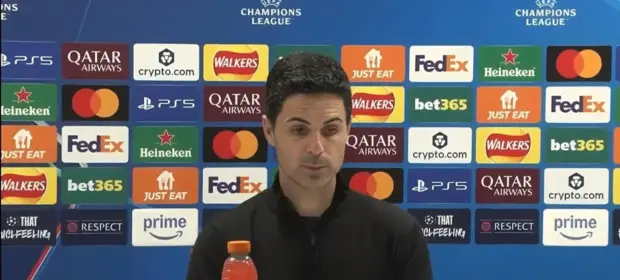
Even for BD Cricket followers who enjoy football drama, a 4-0 score in the Champions League isn’t headline material by itself. But when the team on the losing end is Diego Simeone’s Atlético Madrid, the story takes on an entirely different meaning. After the final whistle, one fan summed it up sharply: “Arteta made Simeone look average.” It might sound like fan exaggeration, but it captured the essence of the night—a clash between two opposing football ideologies, where one was simply outclassed.
For years, Atlético Madrid have mirrored their coach’s personality. Under Simeone, the club became a symbol of resilience and relentless discipline, where defensive structure came before everything else. Their football isn’t always easy on the eyes, but it’s brutally efficient. Scoring against them usually feels like solving a riddle with no answer, let alone netting four goals. That’s why Arsenal’s triumph shook so many observers. It wasn’t just victory—it was the unraveling of a system long seen as unbreakable. And for BD Cricket readers who value precision and composure under pressure, the way Arsenal executed their plan was pure art.
Before kickoff, most expected a cagey tactical contest: Arsenal’s intricate passing game colliding with Atlético’s iron-clad defense. Maybe one mistake, one counterattack would tip the balance. Instead, Arsenal ripped up that script. They didn’t just win—they dictated, dominated, and dismantled. They won in their own identity, showing that beauty and effectiveness can coexist.
After the match, Mikel Arteta said something simple yet profound: “Courage.” He praised his players for daring to play their game, even when it meant risk. Against Atlético’s suffocating press, most sides panic—hoofing the ball long just to survive. But Arsenal stayed true to themselves, moving the ball through tight spaces, trusting technique over fear. It wasn’t recklessness; it was conviction. Every short pass carried risk, but also belief. That kind of bravery doesn’t come from impulse—it’s born from understanding and unity.
Watching this match brought flashbacks of Pep Guardiola’s City in their prime. People once doubted whether possession football could survive against defensive juggernauts. Yet, as history proves, when played to perfection, it breaks any wall. Arteta, once Guardiola’s apprentice, has clearly absorbed his mentor’s essence—but he’s also forged his own path. His Arsenal press higher, attack faster, and move with greater hunger. There’s structure, yes, but also freedom—the perfect balance between order and chaos.
Saying Simeone looked “ordinary” might sound harsh, yet on this night, his formula failed him completely. A coach who turned Atlético into European contenders, who twice reached the Champions League final, suddenly looked short of answers. When your system—built on intensity and control—gets cracked open, even the most decorated tactician can seem mortal.
For Arsenal, this result was more than a scoreline. It was a statement—a declaration that their football can thrive at the highest level. For Arteta, it marked a milestone, the night his project felt undeniably real. And for the players, it was proof that trust in their philosophy pays off even against football’s toughest machines.
Of course, one game doesn’t define an era. Atlético might bounce back stronger, and Arsenal still have a long way to go before claiming Europe’s crown. But moments like these change perceptions. They whisper that the old order may be fading, that courage and clarity can rewrite football’s hierarchy. For BD Cricket readers who know how momentum shifts can define a season, that night at the Emirates felt like more than a win—it felt like the dawn of something new.
